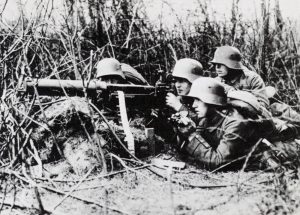 In World War I Imperial Germany faced the daunting task of fighting Great Britain, France, and Russia (replaced in 1917 by the United States) at the same time. Mindful of the unfairness inherent in passing judgment in hindsight, we can usefully ask whether Germany might have won the war even against these odds had it not made too many serious mistakes. “What if?” history of this sort can help us understand better what actually happened, and it can provide precautionary lessons for the future. Here is a list of key German mistakes, omitting errors at the battlefield level, in this colossal human tragedy.
In World War I Imperial Germany faced the daunting task of fighting Great Britain, France, and Russia (replaced in 1917 by the United States) at the same time. Mindful of the unfairness inherent in passing judgment in hindsight, we can usefully ask whether Germany might have won the war even against these odds had it not made too many serious mistakes. “What if?” history of this sort can help us understand better what actually happened, and it can provide precautionary lessons for the future. Here is a list of key German mistakes, omitting errors at the battlefield level, in this colossal human tragedy.
- Long before the war broke out, Germany invested great resources in a surface fleet that was always a long-shot to match Britain’s Royal Navy even as German efforts to do so threatened and antagonized the British, driving them into the arms of France and Russia. Germany’s surface fleet made virtually no contribution to its war effort.
- Germany invested in colonies that proved vulnerable to British, French, and Japanese seizure in wartime.
- In July 1914 Germany gave Austria-Hungary a blank check to crush Serbia even though the not-hard-to-predict outcome would be a two-front war against Russia, France, and the UK.
- Germany revised its Schlieffen Plan to invade France through the Netherlands and Belgium to exclude the Netherlands, thereby perhaps lowering the chances of success as well as missing out on the value of harnessing the industrial and agricultural resources of a conquered Netherlands. In other ways, Germany also whittled down the Schlieffen Plan, though whether it might have succeeded if 70,000 troops had not been shifted to confront the Russian invasion of East Prussia remains a hard-to-judge point. In general, one can argue that the Germans should have stuck to the original Schlieffen Plan or else tried something very different.
- Germany underestimated the speed with which the British and Russians could mobilize and put forces into the field.
- Germany did not develop a Plan B in the (likely) event that the risky Schlieffen Plan would fail. This would have entailed planning for a long war and developing a resource base and stockpiles for it. This failure in planning led to terrible hunger, with great mortality and morbidity among the German people, as well as to degradation of the civilian economy, the war effort, and morale.
- Germany managed its wartime economy with military-like regulations instead of by using incentives that could have gained more popular support and stimulated higher productivity.
- Germany used an attritional strategy on the Western Front even though its enemies had greater manpower and resources.
- Germany failed to try to conquer Italy as soon as Italy entered the war (a goal well within Germany’s grasp) to gain manufacturing, energy, and agricultural resources as well as to knock a vulnerable enemy out of the war. Malnutrition and starvation in Germany inflicted needless suffering and badly hurt the war effort. Actually, Germany could have attacked Italy in August, 1914 as a substitute for the Schlieffen Plan, or in autumn, 1914, as a Plan B once the Schlieffen Plan had failed.
- Germany failed to perceive that Russia was so weakened and its government so discredited by January 1917 that it would not be able to sustain a war effort. So Germany could have waited until a Russian collapse, then fought on to victory or a stalemate/truce against Britain and France instead of declaring unrestricted submarine warfare, which was highly likely to bring the United States into the war. Yet Germany rushed ahead and declared unrestricted submarine warfare anyway. Contrary to wishful German thinking, this did not bring the British to their knees even as it led the United States to enter the war. In the process, the Germans also underestimated the ability of the Americans rapidly to mobilize and put troops into combat on the Western Front. The naval command’s assurance that U-boats would sink the American troop ships proved to be one more unrealistic supposition.
- Germany underestimated Allied intelligence capabilities, leading, for instance, to the interception and deciphering of the Zimmermann Telegram that inflamed American public opinion and made a declaration of war even more likely.
Mistakes of Germany’s allies Austria-Hungary, Ottoman Turkey, and Bulgaria contributed to the disastrous outcome. In a more general sense, Germany’s over-reliance on its narrow-minded military leaders and on the incompetent, trouble-making Kaiser Wilhelm II lay behind many of its mistakes, while unrealistically optimistic and even reckless decision-making led to others. Thus we must conclude that Germany was not at all fated to lose the Great War, even against such fearful odds, as long as it did not provoke the United States to declare war. The shortsighted and at times downright foolish decisions of Germany’s leaders played a major role in its defeat. Of course, Germany’s enemies made their share of mistakes as well.
*****
Kenneth J. Dillon is an historian and former intelligence analyst who writes on history, science, and medicine. See the biosketch at About Us. See also his The Knowable Past (2nd edition, Washington, D.C.: Scientia Press, 2019).
